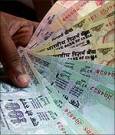 After showing a small rise for two weeks, inflation slipped again at (-)1.54 per cent for the week ended July 18, but there was no respite from soaring prices of essential items like cereals, pulses, and fruit and vegetables.
After showing a small rise for two weeks, inflation slipped again at (-)1.54 per cent for the week ended July 18, but there was no respite from soaring prices of essential items like cereals, pulses, and fruit and vegetables.
The wholesale price index, for the seventh week in a row, remained below zero. It was (-)1.17 per cent a week before.
However, prices of food items like mutton rose 14 per cent, arhar 9 per cent, gram 4 per cent, and fruit and vegetables 2 per cent during the week.
At the same time, prices of imported edible oil increased 4 per cent, and coconut oil, sugar, butter, ghee and gur were expensive by one per cent each.
Commodities that became cheaper during the week include iron ore (by 24 per cent) and jet fuel (7 per cent) while cement and textiles registered a marginal decline.
According to finance minister Pranab Mukherjee, the rise in prices of some food products was due to lower production, high demand and increase in minimum support prices.
"Despite fall in overall inflation, for some of the food products and items of daily use. . . it continues to remain high on account of lower production, increase in the minimum support prices and growth in demand," Mukherjee had earlier informed the Rajya Sabha in a written reply.
The prices of cereals rose about 11 per cent, pulses 16.9 per cent, and fruit and vegetables 14.1 per cent on an year-on-year basis. At the same time, the prices of milk have gone up nearly 4.8 per cent over the last year while spices were more expensive by about 5.4 per cent.
Among manufactured food products, sugar, khandsari and gur went up about 33.1 per cent while processed fish turned dearer by more than 42.7 per cent over last year.
During the week, prices of soft drinks, foundry pig iron and basic pig iron were up one per cent and acids of all kinds turned expensive.
At the same time, prices of minerals like vermiculite jumped by 86 per cent, manganese ore by 77 per cent and silica sand 4 per cent.
Earlier this week, Reserve Bank in its first quarterly review said, inflation is expected to touch 5 per cent by the end of March 2010.
The apex bank said the transitory negative WPI may not persist beyond a few more months.
As a result, with uncertain monsoon and rising global commodity prices inflation is projected at around 5 per cent by March, 2010. This is higher than the projection of 4 per cent made in the annual policy statement, RBI said.
The monetary policy efforts should be aimed at ensuring price stability so as to keep inflation in the range of 4-4.5 per cent with a medium term objective of 3 per cent, RBI added.






 © 2025 Rediff.com -
© 2025 Rediff.com -